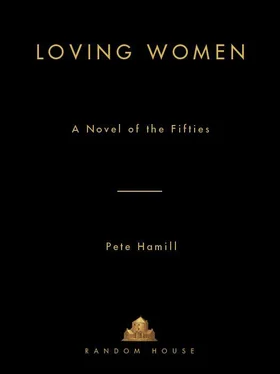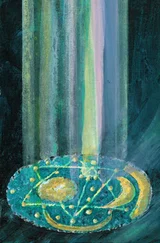But I did grow up feeling very strange. No father. No sports. No friends. And this mother who lived to feed me and please me and guide me, this mother who kept a big drafty house just for the two of us .
That Saturday art class changed everything. For the first time I met people who were something like me. The school was a community of oddballs, loners, kids who stayed home to draw instead of throwing rocks at buses or putting pennies on railroad tracks like every American kid is supposed to do. They were from all over the city and some of them had parents who were divorced and one had a father who was dead and another a father who’d just disappeared. We began to feel that people who didn’t make art or have screwed-up families were the real odd ones in this world .
My mother slaved to help me. You know all those clichés about wearing your fingers to the bone? They were true about Mother. The most expensive things were art books. They still are. But our public library was truly rotten, because good art books always have nudes in them and the goddamned ignorant Baptist idiots wouldn’t allow nudes to be shown in a public place. Afraid the whole male population of Marietta would whack themselves into a coma. So Mother bought the books for me. There was hardly a week when she didn’t come home with at least one book or an art magazine. Always on payday. I used to get excited when I woke up on a Friday morning wondering what she’d bring me that night. I suppose when most boys my age were reading the sports pages or comic books, I was reading Walter Pater and the journals of Eugène Delacroix and books about Rubens and Leonardo and Degas. I was copying pictures from these books, trying to discover how they had done what they did. And I was drunk on books about Bohemias. Dreaming about the Left Bank in Paris and Greenwich Village in New York and garrets everywhere. I wanted to leave the town of Marietta, the state of Georgia, the whole goddamned backward South, and join the real artists in some country of art .
When I graduated from high school, I went right into the Art Institute. By then, Mother had saved some money, don’t ask me how. I guess the war changed it. I guess the damned Japanese ended the Depression when they bombed Pearl Harbor. During the war, Mother became the most unlikely goddamned Rosie the Riveter in America, but she did it, working at the Glenn L. Martin plant in Marietta, her hair tied up in a kerchief. When the war ended she was hysterical for days. At first I thought it was just panic, that she was terrified that she was going to lose her job and the Depression would come back with all its goddamned horrors. But it wasn’t that at all. Mother had learned that the Enola Gay was built by Martin and so she was sure she’d helped drop The Bomb on Hiroshima. It was as if she’d killed every one of those people, just by slamming a rivet into a tail section. She cried about taking blood money. She told me that now everything would be different, that The Bomb was something new in the world. And then she cried again .
But she saved a lot of the blood money, and when I was ready to go to art school full time she had enough for all the extra expenses. I was doing oils, tempera, learning about casein and gouache, and all of that cost a lot. There were some amazing students there, and plenty of fakers, too. Abstract Expressionism had just been given its name, with a big glossy spread in Life magazine, and every second painter was talking about space and the picture plane and trying to paint like Jackson Pollock or Franz Kline. I went my own way. I liked faces, bodies, mood, weather, atmosphere. I loved drawing, not dripping. Maybe I was just afraid to take risks. But I kept going, doing it the older way. It was strange to be out of fashion at eighteen. Still, it was the South; they didn’t really care about all this newfangled stuff from New York. So I had my first show in June of 1950, while I was a junior at the Institute. At a small gallery in Marietta. The pictures were still hanging when the war started in Korea. I was terrified. And furious. I’d grown up believing that World War II would be the last war in the history of the world. Or at least the last American war. I really believed all that crap. And here on this lovely summer day, with my whole life ahead of me, another war had started. In some goddamned place called Korea. Men were dying again, and soon it would be my turn too .
That changed everything, I knew it, and I cried myself to sleep that night in late June when the war began. I felt such a goddamned fool. I’d tried to plan my life. The Depression was over, the war was over, and now we’d have peace forever and live like human beings again. I had it all in the plan. I even wrote it down: art school, then Paris for a year or two, then on to Florence, to embrace the work of the Renaissance masters, learning their secrets. I’d get brown in the sun of Rome. Then, around 1962, I’d return in triumph to the Village and the New York galleries and see my pictures in the museums and the art magazines … I had a plan. Only a stupid romantic fool ever does that .
By winter, men were dying by the thousands and I was ready to be drafted. I started to think about the Navy. I’m not sure why. Probably from looking at all those paintings by Winslow Homer and Turner. Once the notion got into my head, I couldn’t leave it alone. I would lie awake in Marietta, and hear my mother playing the piano (for herself now, the students gone, the money not a problem) and start creating seascapes in my mind. Out at sea, on the bridge of some sleek ship, I would examine the architecture of waves. I would memorize the tones and colors of the sky. Miles Rayfield: on the deck of a great ship .
But it wasn’t just fear of the infantry and the Yalu that pushed me to the Navy. There were other things going on. Some trouble with people at school. And my wife. The details are none of your goddamned business. But one morning I joined the Navy, thinking that it was better than the infantry. Thinking it would get me out of the goddamned South. Thinking I would end up on the bridge of that great ship. It was the stupidest fucking thing I ever did. Now I paint like a pack rat. Hiding in a dark hole. I don’t think I’ll ever see the sun of Rome .
About four o’clock that afternoon, it started to rain. The sky darkened, all helicopters were grounded. I wrapped my pad and the chalks in some butcher paper and sealed the package with masking tape, and then hitched a ride to the locker club with Larry Parsons. He was big and blond and friendless; he was married and lived off the base and seemed always to be about three beats behind everybody else.
“Where you going with the package?” he said.
“A friend’s house.”
“You have friends down here?”
“Sure, don’t you?”
“Well, yeah, I guess I do,” he said, in a puzzled way. “To tell the truth, my wife has more friends than I do. She’s real active in the church, so there’s always something doing. Baking contests and clambakes and stuff like that.”
“Sounds great,” I said, and hurried away from him when he stopped at the locker club. I changed clothes quickly and combed my hair in front of the mirror above the sink. I waited inside the door, watching the rain come in from the Gulf in great slanting sheets. Across the highway, Billy’s neon sign seemed to sizzle. Eden Santana . I started rehearsing what I would say to her and what I would do. And then cut myself off. I couldn’t come to her with a lot of rehearsed lines and moves. She’d know. She’d been around longer than I had and she was just too damned smart for me to play-act with her. I remember thinking then about drawing, and how it might make her just an object of my skill, and therefore less scary and unpredictable. I think Miles had shown me how to use the side of the chalk to create form and volume, how to lay out the figure. But I’m really not sure. Had he told me those things before I went to meet Eden? Or was it after? Now: years later: sitting in a parked car, watching the sky darken and older trees heaving and settling in a wet Gulf wind: am I remembering the feeling of that young man standing inside the locker club, or am I inventing him?
Читать дальше












